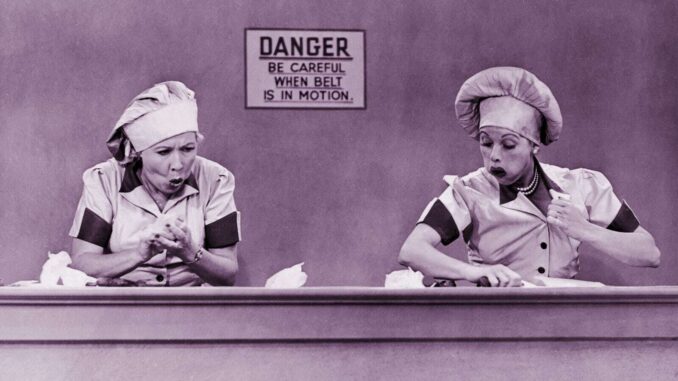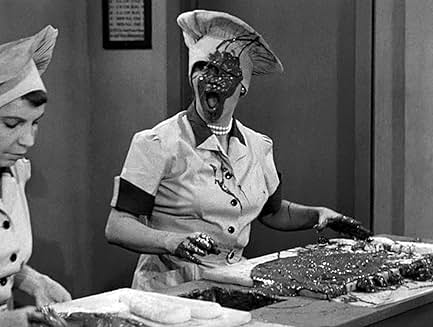
The Setup: When Housewives Trade Places
Aired in 1952, “Job Switching” is one of the most beloved episodes of I Love Lucy. The plot begins with a classic marital debate: Ricky and Fred argue that women have it easy as housewives, while Lucy and Ethel insist that managing a household is just as challenging as earning a paycheck. To prove their point, the couples agree to switch roles—Lucy and Ethel go to work in a candy factory, while Ricky and Fred stay home to cook and clean.
The Iconic Chocolate Factory Scene
What follows is perhaps the most famous physical comedy sequence in sitcom history. Lucy and Ethel are assigned to wrap chocolates on a fast-moving conveyor belt. At first, the task seems manageable, but soon the belt speeds up, overwhelming them. In a frantic attempt to keep pace, they stuff chocolates into their mouths, hats, and blouses, creating one of television’s most enduring images of chaos and laughter.
This sequence not only showcases Lucille Ball and Vivian Vance’s impeccable comedic timing but also cements Ball’s status as the queen of physical comedy. The exaggerated movements, wide-eyed panic, and escalating desperation have made this scene endlessly rewatchable across generations.

Social Commentary Behind the Laughter
Beneath the slapstick, “Job Switching” cleverly comments on 1950s gender roles. The episode flips the script: women enter the workforce, men take on domestic duties—and neither succeeds. Ricky and Fred burn dinner and destroy the kitchen, while Lucy and Ethel fail spectacularly at factory work.
The humor arises from exaggeration, but the subtext reflects the rigid gender expectations of the era. By showing both men and women struggling outside their “traditional” roles, I Love Lucy pokes fun at stereotypes while still keeping the tone lighthearted.
Cultural Impact and Legacy
The chocolate factory sequence has transcended television, referenced in countless shows, movies, and commercials over the decades. It remains a go-to example of sitcom excellence, taught in media studies classes and replayed in anniversary specials.
More than just a gag, “Job Switching” represents the heart of I Love Lucy: ordinary conflicts magnified into extraordinary comedy, powered by Lucille Ball’s fearless commitment to physical humor.
Why It Still Matters
Seventy years later, the “Job Switching” episode continues to resonate. It’s not only a masterclass in comedic writing and performance but also a time capsule of 1950s America—capturing the tensions, humor, and cultural dynamics of the era.
Most importantly, it proves that great comedy is timeless. Whether viewers are discovering it for the first time or revisiting it for the hundredth, the chocolate factory scene still delivers laughter, reminding us why I Love Lucy remains one of the greatest sitcoms of all time.
